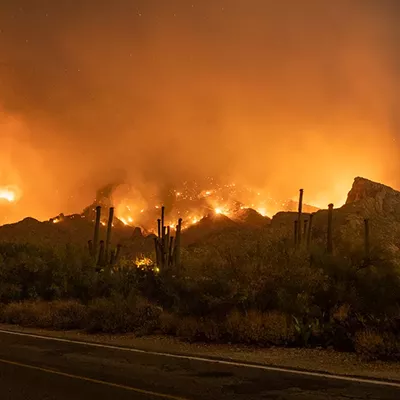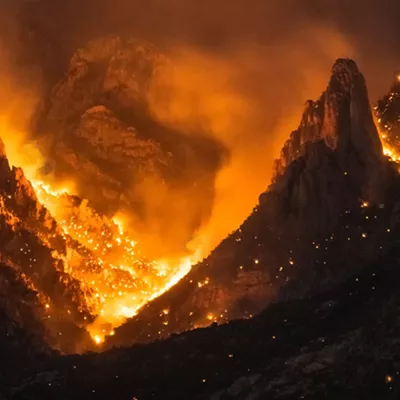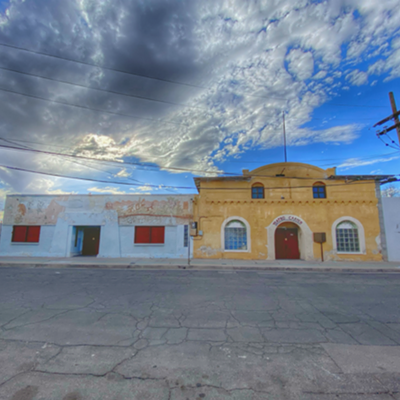No more water, the fire next time.
--African-American spiritual
Here's to the hardy, realistic folk of Summerhaven, who evacuated calmly and without complaint when the Bullock Fire threatened to blow up on May 25. Here's to their acceptance of what it means to live on top of a mountain and to their open-hearted valuation of the fire crews' lives over their own well-loved homes.
That morning, as the big smoke bloomed over Mount Lemmon, everybody in Tucson who happened to look up must have worried. From any corner you could see it growing, changing color as it shifted in and out of the shade of its own private cumulus cloud. (You just had to pray that the lighting, and not a rush into different fuel, was the cause of the sudden darkenings.)
I was out at about 11, running errands, when sheer spectacle and anxiety stopped me at Seventh Street and Craycroft. I'd been watching the smoke as I walked along, but to get home I had to turn west, away from the mountain, and I'd just realized that I didn't want to turn my back on it. While I stood there, a guy about to make a left stopped, rolled down his window and said, "Nasty-looking, huh?" He'd just heard on the radio that the fire was within a half-mile of the highway, the trigger for evacuation. Obviously his desire to hear that everyone was getting out was as acute as mine.
If it had been me up there--well, it wouldn't have been me--but in an alternative life in which I wasn't so gut-scared of fire that I could have lived on Mount Lemmon, or in the grasslands down around Sonoita or, God knows, anywhere in Southern California, I would have been drinking margaritas in a motel on Tanque Verde days before, I think.
As it was, like everyone else down here in the flats, I could only watch the signs across the clear, dry miles, think about men and women sweating under drought-tempered pines and pray for still weather. And hope that whoever was running the fire was really good, and really, really careful.
By mid-afternoon the wind had come up and you could barely see the smoke from town. The next morning the Star had pictures of the Summerhaven people getting into their cars, and that dread-choked, September 11 feeling started to subside.
I was born in the Pacific Northwest, where, in the 1950s, children were brought up to hate and fear wildfire above all things, except possibly Nikita Kruschev. We considered Smokey Bear a personal friend, diligently colored "Keep Washington Green" posters every year and listened to our elders speak with awe of the great fires--Yacolt, Wenatchee and, mother of terrors, Tillamook. (Nana invariably pronounced the words "the Tillamook Burn" in the same tone of voice as "Pearl Harbor." The fire took down 300,000 acres of Douglas fir in the late summer of 1933, blowing up from 40,000 acres to 240,000 in less than 24 hours, depositing 3 feet of ash in the fertile Oregon pastures downwind--yep, there's a connection--and sending up a smoke column as tall as a nuclear mushroom cloud. Only heavy rain in early September stopped it, and the tract reburned violently every few years until 1951.)
Of course I grew up to be a hopeless true-fire junkie, an ideally enthralled reader of Stephen Pyne's magisterial Cycle of Fire histories (from which I filched the quotation above), of Norman Maclean's terrifying Young Men and Fire (about the 1949 Mann Gulch fire that killed 13 firefighters) and of John Maclean's account of the 1994 Storm King Mountain catastrophe, Fire on the Mountain (death toll, 14). I'm taking Sebastian Junger's Fire on vacation.
And, perversely, I've spent time on fire lookouts, so I've drunk beer with hotshots and smokejumpers, listened to Godlike dispatchers and panting crew chiefs on the radio and watched old bombers dump orange slurry from far above. A few weeks into the most ominous Southwestern fire season in memory, I am here to testify that the least important thing about a fire is how it started. Read Pyne, a former North Rim hotshot who teaches at ASU: Anything that can burn, will burn, sooner or later. That's why God made insurance companies.
The most important thing, the only important thing, is that nobody gets killed.
The Forest Service is the poor cousin of the federal government and it's full of people who do their jobs for love and often under intense and deeply stupid political pressure. They work with hand-me-down equipment scavenged from every branch of the government that's better funded--which is, essentially, all of them. Lookout cupboards are stocked with indestructible green melamine plates stamped "USMC," and the high-power binoculars are retired from the Navy. Fire crews dig trenches with folding shovels that once belonged to the Army and hump packs sewn for Vietnam or the Gulf. They make do, they work like dogs and they risk their lives too often for too little.
We all love our houses. Houses in high places, out amongst the trees and grasses, are wonderful. But when fire comes, and come it will, the only sane thing to do is to emulate the good people up at Summerhaven. Pack up the photo albums and the china, load up the cats and the dogs and the insurance policy, and go. Nobody should have to risk death for someone else's stuff.









